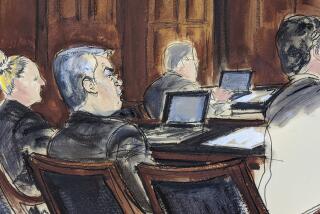Noriega Case Mired in Frozen Legal Fees : Drugs: The former Panamanian dictator’s Jan. 28 trial may have to be delayed since his bank accounts are inaccessible.
- Share via
MIAMI — Nine months after being flushed from his sanctuary in Panama, Manuel A. Noriega is entangled in a financial and legal thicket of international proportions.
Isolated in a two-room cell in a federal prison south of here, the one-time dictator anxiously awaits a Jan. 28 trial that may be postponed because he cannot get his hands on the money he needs to launch a defense against massive racketeering and drug-smuggling charges. In fact, his defense has come to a complete standstill as he fights for access to some of the millions of dollars he has stashed in dozens of banks overseas.
U.S. District Judge William M. Hoeveler, who will preside over Noriega’s trial, is still attempting to solve the legal-fee problem. But its resolution continues to evade everyone.
Last winter the Justice Department tracked down 27 overseas bank accounts belonging to Noriega and asked the host countries--mainly European nations--to freeze the $20 million in the accounts because they represented the illicit proceeds of international narcotics trafficking.
But Noriega’s Miami-based lawyers protested that the deposed general needs access to some money to pay their mounting legal bills. Hoeveler then prodded federal prosecutors to “unfreeze” several million dollars for legal bills.
(An earlier proposal for the U.S. Treasury to loan funds to Noriega for his defense collapsed when the plan turned out to be so expensive it was deemed impermissible under federal law.)
The Justice Department told Hoeveler in a recent court filing that it is using its “best efforts” to get some foreign bank accounts unfrozen. But problems have arisen because the new government of Panama claims that the money belongs to it, not Noriega.
Already Germany has told U.S. officials that it will not release $11.8 million from a bank account in Hamburg because of objections by Panamanian officials, according to court records.
Some lawyers associated with the defense charge that Justice Department attorneys have not been overly diligent in trying to free up the money they had succeeded in freezing, perhaps in the hope a trial delay would give them more time to strengthen their case and put added pressure on Noriega to accept a plea bargain.
“The U.S. doesn’t want to go to trial yet,” said Sam Burstyn, who is representing a co-defendant, Lt. Col. Luis A. del Cid.
Frank A. Rubino, Noriega’s chief defense attorney, said that his multimillion-dollar defense effort has been stalled for months.
“Even if the money became available today, it would be six to nine months before a half-dozen investigators I would have to employ could go through the thousands and thousands of records and documents in Panama that I am told exist,” Rubino said.
Jon May, another attorney for Noriega, said that the U.S. government has been deliberately slow in getting the paperwork completed to send to banks abroad.
“They look upon us as the enemy,” May said. “They don’t want to help Gen. Noriega.”
Prosecutors refuse to be drawn into a public discussion of the controversy. But they said in a recent court filing that they are seeking release of a separate $4 million from foreign bank accounts in Marseilles and Vienna.
“The U.S. government does not know how long it will take for those foreign authorities to act,” said Assistant U.S. Atty. Michael P. Sullivan.
Hoeveler, in an interview, called the bank account problem “a real impasse that’s been holding things up.” He conceded that “it may push the trial back a bit.”
The judge has also indicated that eventually he might be forced to appoint a public defender for Noriega, even though the former dictator strongly prefers to keep the defense team he retained, at rates of up to $350 a hour, before his extradition.
Noriega, meanwhile, is described by his lawyers as impatient.
More to Read
Sign up for Essential California
The most important California stories and recommendations in your inbox every morning.
You may occasionally receive promotional content from the Los Angeles Times.













